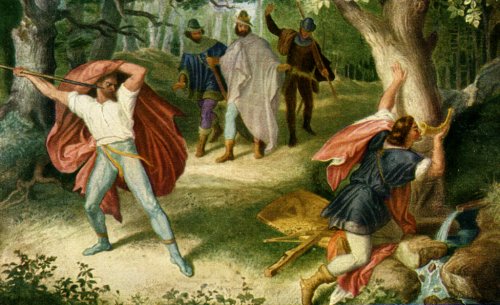Karl Wilhelm Friedrich Schlegel\'s (1772-1829) contributions to Indology marked a pivotal moment in Western intellectual history, catalyzing the notion of ‘rediscovering’ Aryan origins in the West. This led to the romanticization of India within Germanic thought, constructing a mythical origin of European nations in a poetic dawn of humanity. At a time of intense Franco-German rivalry, culturally and militarily, France enjoyed its status as a Renaissance nation, a successor to Greece and Rome. Spain and Portugal glorified their colonial feats in the Americas, while Britain celebrated its prosperous empire centering on India. In contrast, Germany, lacking such claims, was often depicted as home to barbarian tribes that had ravaged the Roman civilization in historical narratives.
Friedrich Schlegel was a pioneering figure in establishing the theory of racial hierarchy, distinguishing not only between Europeans and non-Europeans but also among European groups themselves. He was well-versed in the works of William Jones on Indian religions, who had suggested a racial classification for humanity but refrained from asserting that the Indo-European lineage originated in India. Initially, Schlegel romanticized India, but his later writings reflect a stark shift. He ultimately rejected Indian spirituality, dismissing it as pantheism through the lens of his Christian doctrine. This evolution in Schlegel\'s thought underscores his influential, albeit controversial, role in shaping Western intellectual history and racial theories.
Despite rejecting Sir William Jones\'s specific racial theories, Friedrich Schlegel adopted certain assumptions about Indian racial identity, influenced by his Sanskrit studies in Paris beginning in 1802. Initially enchanted by India, Schlegel later denounced Indian religions, deeming them incompatible with his Christian worldview. Subsequently, his focus on Indology shifted to exploring the Germanic past and the origins of feudalism. Schlegel used Indology as a means to argue that Germanic culture and social structures were more legitimate and advanced than those of ancient Greece, to which French culture and Republicanism proudly traced their roots. By asserting that German culture and feudal systems originated in ancient India, he sought to grant them a venerable antiquity, challenging the Renaissance-based cultural supremacy of France.
Despite his rejection of India\'s religions and conversion to Catholicism, Friedrich Schlegel\'s fascination with Indian studies played a pivotal role in shaping a novel myth of Germany. India, once a source of spiritual allure, now served as a venerable historical progenitor for German nationalism, medievalism, and Catholicism. Schlegel refashioned India\'s ancient legacy to bolster the legitimacy of German medieval feudalism, contrasting it with the French\'s classical Greek influences.
Previously, German Romanticism\'s myth about India\'s antiquity, as seen in Herder’s view of India as the cradle of civilization, was both aesthetic and religious. However, Schlegel’s new myth was propelled by German political chauvinism. His objective was clear: to assert an alternative to the Greek origin of European culture, discrediting French neo-classicism and elevating German cultural status.
Schlegel envisioned ancient Germans as descendants of Indian Aryans, migrating to Europe and bringing with them an advanced civilization. He described India as \"the happiest and most fertile land on earth,\" suggesting that ancestral piety, rather than mere material motives, triggered the migration. These migrants, joined by smaller tribes, contributed to Northern Europe’s ethnic diversity. Schlegel also posited a second wave of Indian migration creating the civilizations of Greece and Rome, painting these sects as heretical outcasts fleeing religious strife.
Central to Schlegel’s narrative was the portrayal of ancient Germans as \"noble savages,\" inherently civilized due to their Indian Aryan roots, standing in stark contrast to the decadent Romans. This myth served Schlegel\'s nationalistic aims, portraying Germans not as barbaric destroyers of Greco-Roman civilization, but as defenders of freedom and virtue against foreign oppression.
In sum, Schlegel\'s fabricated origin story connected German cultural and political aspirations to an illustrious Indian past, legitimizing German superiority and advocating resistance against Napoleonic France. This myth of Indo-Germanic heritage was not merely a historical claim but a strategic tool in the cultural and political elevation of Germany.





No comments yet. Be the first to comment!